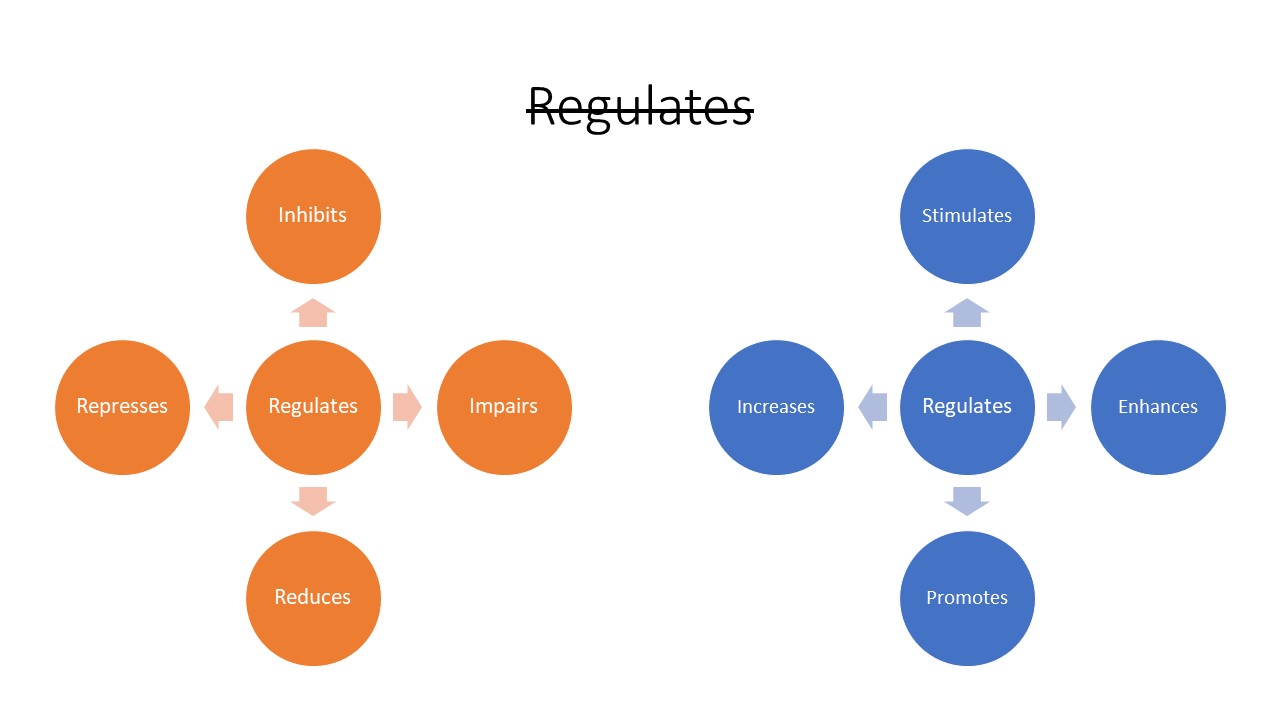The Importance of Precision
One of the most common issues I encounter as an editor is the use of imprecise verbs in scientific research. It is possible that the author cannot be more precise, because the experiments have not been done to determine how the change occurred or because the conditions may produce diverse outcomes. However, these should be made clear for the reader. Otherwise, the reader may interpret the ambiguous language inaccurately.
If the response is diverse, then state this clearly. For example, many transcriptional regulators function as both promoters and repressors of gene expression. If that is the case, then state “transcription factor X can stimulate or repress gene expression,” rather than using the ambiguous verb “regulates.” If the gene that you measure as the readout is stimulated by the transcriptional regulator, then use stimulates (or promotes or increases) rather than “regulates.”
As an example of unnecessary ambiguity common in signaling research, consider the phrase “changes the phosphorylation” as in “Exposure to hypoxia changes the phosphorylation of protein X.” Does the amount of phosphorylated protein X increase or decrease? Does the relative proportion of the total amount of protein X that is phosphorylated increase or decrease? Is the change related to a change in stability or overall abundance of protein X? Did the study provide data to unambiguously determine what the authors mean by “changes the phosphorylation”? Did the authors quantify the abundance of both the phosphorylated and nonphosphorylated forms of protein X?
As an author, you never want to leave the reader guessing at your meaning. You want to be clear, concise, accurate, and precise.
It is acceptable to introduce a concept with less precise language and then explain in more detail with more precision. However, when word count is limited, this takes extra space that may be needed to present other data or make other points in the grant or manuscript.
From Imprecise to Precise
Here, I provide a short list of phrases (note the verbs) to avoid and examples of more precise phrases that could be used instead, depending on how much mechanistic detail is known. Often the text will start by describing an initial observation and then subsequent data will explore the mechanistic details. Be careful not to put the details in the description of the initial observation. Only state what the data that have been shown so far support.
Do not sacrifice accuracy for precision.
Do not draw mechanistic conclusions that are not supported by the published literature or the data shown in an attempt at precise, concise presentation. I use the phrase gene expression as an example. If you measure mRNA abundance and do not provide circumstantial (transcription factor binding to the promoter or enhancer) or direct evidence (nuclear run-on assay) for gene expression, then you cannot know unambiguously how a change in the mRNA abundance occurred. If you measured mRNA abundance or transcript abundance, then state the data as such and then you can use that data to infer a change in gene expression. You should clearly state that you are using the change in mRNA as a proxy for or to infer a change in gene expression. There are multiple mechanisms by which the abundance of a transcript can change and gene expression is only one mechanism. By assuming that the reader “knows” this is an inferred mechanism and that others are possible, the text can inadvertently mislead the reader or a computer performing text mining.
Writing Precisely: From Imprecise to Precise
Samples of imprecise, ambiguous words and examples of more informative phrases or terms that can be used depending on the mechanistic details that are known or supported by the data.Want more tips on effective science writing? Check out the Career Training Presentations and Workshops and invite me to give a presentation or workshop. Contact me to get help writing your next grant, manuscript, or application.
Cite as: N. R. Gough, Writing Tips: Words to Avoid. BioSerendipity (19 March 2018) https://www.bioserendipity.com/writing-tips-words-to-avoid/

